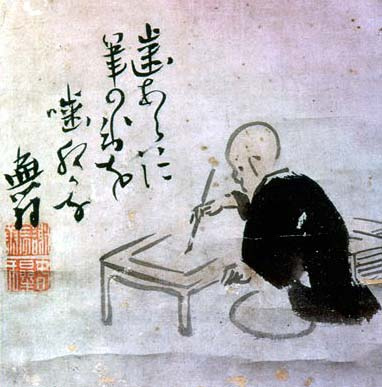JAPAN
Today I pass the time reading
a favorite haiku,
saying the few words over and over.
It feels like eating
the same small, perfect grape
again and again.
I walk through the house reciting it
and leave its letters falling
through the air of every room.
I stand by the big silence of the piano and say it.
I say it in front of a painting of the sea.
I tap out its rhythm on an empty shelf.
I listen to myself saying it,
then I say it without listening,
then I hear it without saying it.
And when the dog looks up at me,
I kneel down on the floor
and whisper it into each of his long white ears.
It's the one about the one-ton
temple bell
with the moth sleeping on its surface,
and every time I say it, I feel the excruciating
pressure of the moth
on the surface of the iron bell.
When I say it at the window,
the bell is the world
and I am the moth resting there.
When I say it at the mirror,
I am the heavy bell
and the moth is life with its papery wings.
And later, when I say it to you in the dark,
you are the bell,
and I am the tongue of the bell, ringing you,
and the moth has flown
from its line
and moves like a hinge in the air above our bed.
JAPÁN
Ma azzal ütöm el az időt,
hogy egyik kedvenc haikumat olvasom,
néhány szót ismételgetve, szakadatlanul.
Olyan, mint ugyanazt a tökéletes
kis szőlőszemet enni
újra meg újra.
Miközben a házban sétálok, csak mondogatom,
és hagyom, hogy minden szobában
hulldogáljanak a levegőben a betűi.
Megállok a zongora nagy némasága előtt, és elmondom.
És elmondom egy tengeres festmény előtt.
Lekopogom a ritmusát egy üres polcon.
Hallgatom magam, ahogy elmondom,
aztán elmondom anélkül, hogy hallgatnám,
aztán hallgatom anélkül, hogy elmondanám.
És amikor a kutya rám néz,
letérdelek hozzá,
és belesúgom mind a két hosszú fehér fülébe.
Az egytonnás templomi
harangról szól,
amin egy lepke alszik,
és valahányszor elmondom, érzem
a lepke kínzó nyomását
a vasharang felületén.
Amikor az ablakban mondom,
a harang a világ,
én pedig az a pihenő lepke vagyok.
Amikor a tükörben mondom,
én vagyok a súlyos harang,
a lepke pedig a papírszárnyú élet.
Később pedig, amikor neked mondom a sötétben,
te vagy a harang,
és én vagyok a nyelv, amely megkongat,
a lepke pedig elszállt a verssorából,
és úgy csapkod az ágyunk fölött,
mint egy zsanér a levegőben.
Ford.: Kőrizs Imre
_______________________
Billy Collins: Az a baj a költészettel, Jelenkor, Bp., 2020
Yosa Buson (1716 – 1784)
On the temple's great bell,
a butterfly sleeps.
***
on the temple bell
sleeping
a butterfly
****
On the one ton temple bell
a moon-moth, folded into sleep,
sits still.
(trans: X. J. Kennedy)
Templomi harang bronzán libegve
alszik
egy csöppnyi lepke.
Kosztolányi Dezső fordítása
***
釣鐘にとまりて眠る胡てふ哉
tsuriganeni tomarite nemuru kochoukana
néma harangon
álomba szenderült
egy pillangó
Terebess Gábor fordítása


.jpg)

